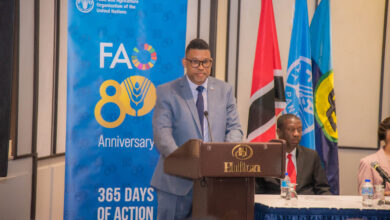On behalf of UNDP’s Regional Bureau for Latin America and the Caribbean, I would like to extend my thanks to the CARICOM Secretariat for hosting this very timely High Level Advocacy Forum on Statistics: Strategizing for the Development of Statistics in the Caribbean Community in the Post-2015 Development Agenda. I wish to also thank the Government and people of Grenada for hosting the conference in beautiful St. Georges, and for the excellent arrangements.
At the 45th session of the United Nations Statistical Commission, Mr. Wu Hongbo, Under Secretary-General for Economic and Social Affairs and for the International Conference on Small Island Developing States, made an astute statement that “Sustainable Development will need to be supported by Sustainable Statistics.”
In noting the efforts of the UN Statistical Commission he observed that the tools developed over the last seven decades “have allowed our numbers to ‘communicate’ across borders, and to add-up regionally and globally.”
It is this very important role that data plays in sustainable human development, on a global level, which makes it indispensable, and for which a data revolution is pivotal, to ensure the continuation of resources put towards strengthening approaches to data collection, analysis and distribution.
The United Nations Development Programme has been working globally to support capacity development in the area of data collection in particular, in relationship to issues of human development, poverty reduction, democratic governance and promotion of relevant and human rights-based decision making and policy development.
UNDP’s work focuses on development from a global perspective and transcends the fragmentation of much development work being done, through the family of human development indexes and the innovation and creativeness that has been brought by the Human Development Reports at all levels: global, regional and national.
The new approaches to understanding poverty, such as the Multi-Dimensional Poverty Index, has led to a new way of understanding development altogether, and are at their core, transformative.
As we advance in the Post-2015 development agenda, the global data gaps have been highlighted as we seek to obtain the most accurate picture of human development, from the social, economic and environmental perspectives.
While there have been several opportunities to provide input into the Post-2015 agenda, it can be argued that the Caribbean Region has been disadvantaged by not having the most relevant and up to date information to guide discussion and decision making, which limits the development of a framework that is relevant to the Caribbean context.
Even more importantly, it means that whatever framework is decided, we risk a repeat of the case of the MDGs, where in the absence of baseline data, it was difficult to develop implementation plans and monitor progress towards the achievement of our goals.
It also means that the built in flexibility which is required to undertake any successful development intervention, was limited by constraints in having knowledge of and understanding changing circumstances to the detriment of building adaptable and sustainable programmes. Having access to data will mean progress towards building resilient and highly adaptable societies.
In looking forward, there is the September 2014 Third International Conference on Small Island Development States in Samoa, as well, the Climate Summit which will be held in New York on 23 September, in addition to the on-going meetings of the Open Working Group on the Post-2015 agenda on which there are three CARICOM member seats.
These provide opportunities to ensure that we place the idea of “sustainable data” at the heart of decisions on policy formulation, and take the time to look into the difficulties that CARICOM countries have encountered in the creation of statistical, human and institutional systems.
This is an effort to enhance the availability and quality of information for decision making and to advocate for the collection, analysis and distribution of data under a systematic framework to monitor and evaluate progress, make evidence-based decisions and policies to build and strengthen resilience, and thereby reduce the social, economic and environmental vulnerabilities of CARICOM Member States.
We must work to ensure the Region’s access to the most up to date technology and technical support to ensure the realisation of the data revolution. Towards this end, investments in the capacities of National and Central Statistical Offices must not be sacrificed, and efforts towards expanding the utilisation of statistical officers in line ministries should be employed.
Overall, the value of data cannot be underestimated, and investing in this will yield both short and long term results.
It has become a priority for the UN system to ensure that economic and social development are undertaken in relation to environmental capacity, and also, within the context of environmental protection and sustainable development, and with your continued support and our collective efforts, I am confident that this priority will be realised.
As I look at the agenda for today’s deliberations, I am encouraged to see that we are discussing investing in statistics for policy making, that we will be strategizing and advocating, looking at how we can get the most effective results and how partnership building across sectors will ensure the sustainability of our efforts.
I am encouraged by this, and feel that we are taking a realistic approach towards making a pivotal investment in the future of this Region.
I thank you for your attention, and look forward to a productive three days.






